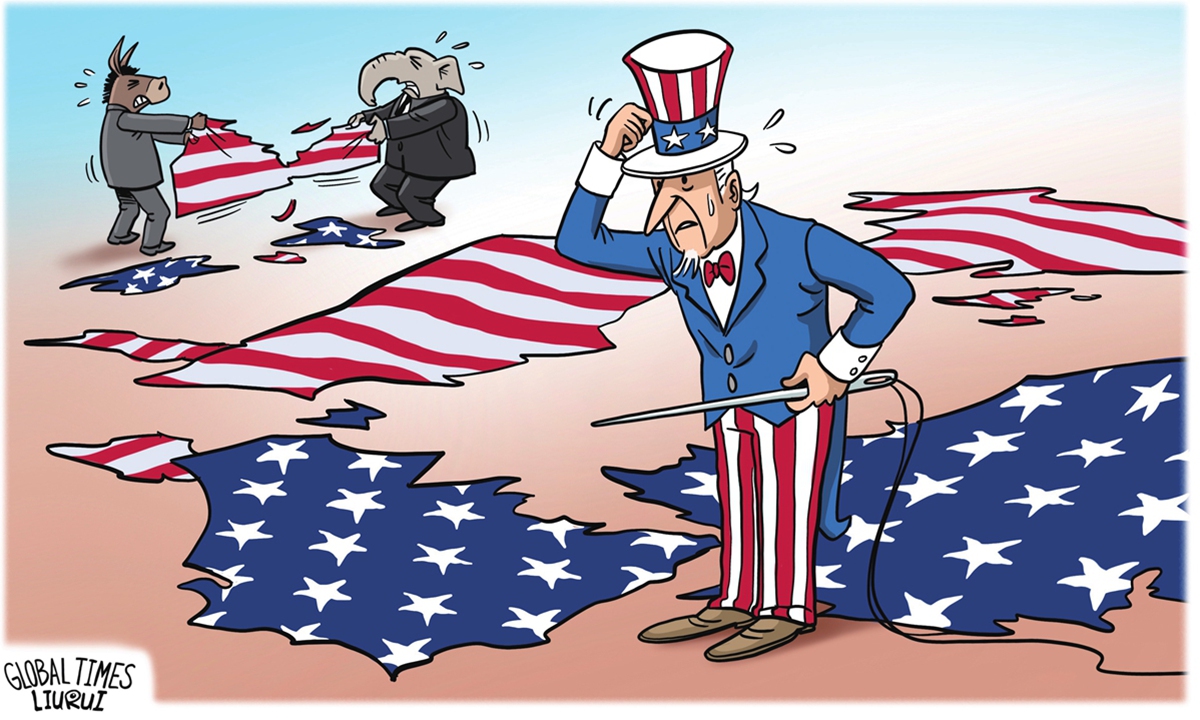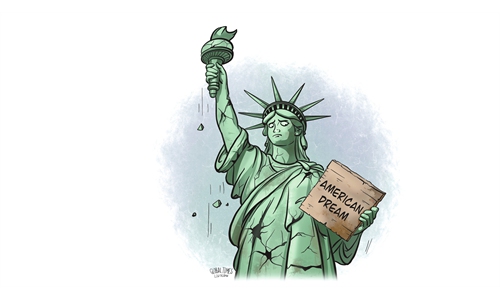
Illustration: Liu Rui/GT
This year is an election year in the US, and the competition between the Republican and Democratic parties is more intense than ever. A hostile political atmosphere prevails in the US with a rising trend toward election violence. Recently, US President Joe Biden delivered a televised speech, urging to "lower the temperature" in US politics and avoid normalizing election violence. The escalating extremism in US politics has attracted widespread attention from the international community, and it is indeed necessary to continue to observe and accurately assess its international impact.First of all, political polarization in the US has led to widespread populism and extreme nationalism, triggering a ripple effect in numerous Western nations. The clash between these two ideologies has created significant risks in US politics.
In the context of globalization, where political ideas and practices are generally "contagious," there is a growing trend of typical polarization in the politics of many Western countries. The criteria for defining national identities are becoming increasingly blurred, as populism and nationalism vie for dominance. Deep-seated divisions and unrest in both national politics and society have become commonplace in Western countries. The increasing political fragmentation in more and more European countries has weakened the foundation of the self-proclaimed "unity" in Europe, making coordination increasingly scarce.
Looking around the world, the countries that imitate the US are generally in a state of internal division in politics, which can be seen as the consequences of the spillover effects caused by the US' polarized politics that lacks "centrism." The key prerequisite for political stability in all countries must be to abandon populism and extreme nationalism. If lessons from the current political polarization and violence in the US are not learned, international politics will inevitably suffer from long-term confrontation and chaos.
Second, US politics is currently facing a crucial moment in determining its direction. The two parties' ideas on the construction of domestic and foreign policies are generally in conflict and compromise will be difficult. This has led to widespread confusion and bewilderment among Americans about US politics, and has also resulted in great uncertainty in the international order and situation.
More and more facts since the end of the Cold War have proven that the post-World War II international order structure tied to the US is inconsistent with the universal demands and interests of the international community. The Democratic Party aims to establish a free international order, while the Republican Party with Trumpification seeks to build an international order with strong populist undertones. The differences between the two are so obvious that other countries are gradually realizing that it is difficult to engage constructively with a US whose values and behavior are disordered and unpredictable.
It remains unclear for the international community whether the US will lean toward embracing globalism or doubling down on isolationist protectionism in the future. The US' own understanding of the rules of international order is so contradictory, so how can it expect other countries to believe in its repeated advocacy for establishing a "rules-based international order"? The polarization and partial dysfunction of US politics have damaged its international credibility and made it a significant obstacle to the ongoing positive evolution of the international landscape. It is crucial, for both the US and the world, that US politics regain health and rationality.
Third, US politicians have already lost their belief in democracy and the willingness to compromise, which results in a rigid political system that can only bring more challenges for international affairs rather than constructive solutions.
US policymaking elites have a tradition of interpreting international politics through domestic political logic. It is this prevailing life-and-death binary worldview in the US that creates and sustains the ongoing tension in the Russia-Ukraine conflict and the Palestine-Israel conflict. As a nation with profound comprehensive power, if the US is only interested in engaging in party struggles and factionalism domestically and confronting its imaginary adversaries abroad, it will ultimately plunge the world into greater turmoil. It is hoped that the US can genuinely practice democracy and the spirit of seeking common ground, which are unavoidable preconditions before making any contributions to global development and stability.
Amid the current global turmoil, the political disarray in US politics has emerged as a serious obstacle on the path toward a stable and prosperity-oriented international order. We hope that countries around the world can cooperate more closely to enhance their shared well-being, thereby realizing the goal of a global community of shared future.
The author is a professor at the Institute of International Relations at the China Foreign Affairs University. opinion@globaltimes.com.cn


